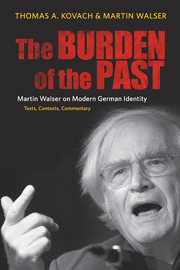Book contents
- Frontmatter
- Contents
- Acknowledgments
- The Burden of the Past
- Introduction
- Our Auschwitz (1965)
- No End to Auschwitz (1979)
- Handshake with Ghosts (1979)
- Speaking of Germany (A Report) (1988)
- Experiences while Composing a Sunday Speech: The Peace Prize Speech (1998)
- On Talking to Yourself: A Flagrant Attempt (2000)
- Conclusion
- Suggestions for Further Reading
- Index
Our Auschwitz (1965)
Published online by Cambridge University Press: 05 February 2013
- Frontmatter
- Contents
- Acknowledgments
- The Burden of the Past
- Introduction
- Our Auschwitz (1965)
- No End to Auschwitz (1979)
- Handshake with Ghosts (1979)
- Speaking of Germany (A Report) (1988)
- Experiences while Composing a Sunday Speech: The Peace Prize Speech (1998)
- On Talking to Yourself: A Flagrant Attempt (2000)
- Conclusion
- Suggestions for Further Reading
- Index
Summary
Context
DURING THE FIRST DECADES FOLLOWING THE WAR, West German society was preoccupied with the task of rebuilding its physical structure after the damage caused by Allied bombardment of German cities and creating a vibrant new economy — an accomplishment widely known as the “Wirtschaftswunder” or Economic Miracle. Most Germans wanted above all to put the past behind them, a desire (as argued by Alexander and Margarethe Mitscherlich in their 1967 book Die Unfähigkeit zu trauern [The Inability to Mourn]) that sometimes verged on a kind of pathological denial, even a tendency to think of themselves as the real victims. The writers of Gruppe 47 were an exception, in that they did address issues stemming from the Nazi past, including the complicity of “ordinary Germans” in Hitler's rise to power. But even they, as Ernestine Schlant argued in her more recent book The Language of Silence: West German Literature and the Holocaust (1999), were notably silent regarding what most people today regard as the most horrendous and lasting element of that past — the Holocaust.
The postwar Nuremberg trials, which brought some of the top Nazi leaders to trial, did much to document and expose the details of the atrocities committed under the regime, but the fact that these trials were initiated and conducted by the victorious allies (neither West nor East Germany had yet been established) led many Germans to dismiss them as “victors' justice.”
- Type
- Chapter
- Information
- The Burden of the PastMartin Walser on Modern German Identity: Texts, Contexts, Commentary, pp. 5 - 22Publisher: Boydell & BrewerPrint publication year: 2008



